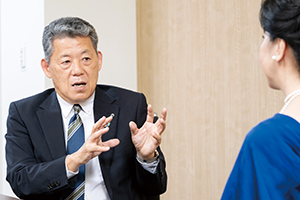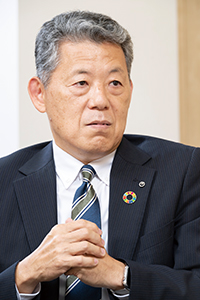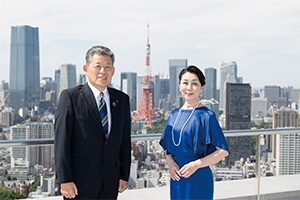Connecting the ICT and electric power businesses
—It has been a little more than a year since you took office as president and CEO of NTT Anode Energy. Looking back over the past year, could you tell us about your feelings and the current status of NTT Anode Energy?
I left NTT WEST, where I spent 23 years, to become president & CEO of NTT Anode Energy in June 2022. The business I oversee has shifted significantly from telecommunications to electric power, and the speed of change, scale of investment, and nature of capital investment differ from the factors in the telecommunications industry where I worked for many years, so I do feel like I’ve changed jobs. While making the most of my knowledge and experience in the telecommunications facility business that I had been in charge of at NTT WEST, I am keeping my ear to the ground and studying trends in the electric power business and society as a whole.
The environment surrounding the energy and electric power business is changing dramatically as exemplified by the global trend toward decarbonization, unstable energy-resource prices, and reforms to power systems owing to the increased introduction of renewable energy and the decline in thermal-power generation. In Japan, a law for promoting the smooth transition to a decarbonized growth-oriented economic structure, called the Green Transformation (GX) Promotion Law, came into effect in June 2023 to accelerate GX initiatives aimed at both achieving a stable energy supply and decarbonization, including that of the power system.
Under these circumstances, NTT Anode Energy, as an expert group in the field of energy and electric power in the NTT Group, intends to play a role in bridging between the information and communication technology (ICT) and electric power businesses. Focusing on our four core businesses (explained later), we are promoting decarbonization and local production for local consumption of energy in cooperation with NTT Group companies and partners. This initiative takes into account the creation of a circular-economy society, as stated in NTT’s new medium-term management strategy announced in May 2023, and aims to help achieve carbon neutrality in Japan by 2050. We are expected to contribute to the NTT Group and society as a whole by achieving the NTT Group’s environment and energy vision and creating a smart energy business in Japan and overseas. Although we are under a lot of pressure, I find it very rewarding.

—What is the current situation of the energy and electric power industry? And how is NTT Anode Energy approaching this situation?
Over the last 10 to 20 years, the energy and electric power industry has faced many challenges. Telecommunications is evolving not day by day, but minute by minute. The energy and electric power business too has undergone major changes. In preparation for power shortages in summer and winter in Japan, electric power companies are requested to ensure stable power supplies; in fact, some experts are calling for planned power outages. The form of power generation has been required to change to renewable energy, and deregulation, including the separation of power generation, transmission, and distribution and the liberalization of the retail markets for electricity and city gas, has progressed. The electric power industry needs to address these challenges and create new businesses that are environmentally responsible.
To address these situations, about 3000 energy and electric power experts within the NTT Group joined NTT Anode Energy. In addition, specialists from outside the Group around the world were hired mid-career. NTT Anode Energy is truly an organization that embodies diversity and inclusion, and as a compass that guides all employees in the direction in which they can work together, we have set up our company’s purpose as the “Anode Way,” namely, “Creating a new common sense in energy through technology and inquisitiveness.” Created by our employees, the Anode Way is written in simple Japanese with easy-to-understand explanations.
We also compiled “Our Story,” which is our history to be shared with all employees. Tracing the footsteps of our predecessors, we discovered the fact that in 1962, they installed a small solar-power generator on a public telephone box and tested it for practical use. After the Great East Japan Earthquake in 2011, they supplied electricity through large-scale solar-power generation, which we later launched as a business. These examples gave us the opportunity to realize that what our predecessors have endeavored and built have become our great assets.

Developing a smart energy business with a value chain consisting of four core businesses
—It has been four years since the foundation of NTT Anode Energy, and its identity has been steadily established. Could you tell us about the businesses you are focusing on?
We are currently operating four businesses: Green Power Generation Business, Local Grid Business, Consumer Energy Business, and Construction/Maintenance Operation Business. We have built a value chain through these businesses and are developing it as a smart energy business.
In the Green Power Generation Business, we are developing renewable-energy power plants, such as solar, wind, geothermal, biomass, and hydropower, to meet the green power needs of customers and NTT Group companies. We intend to build power plants without causing large-scale deforestation and other issues to protect ecosystems and living environments. In August 2023, we acquired shares in Green Power Investment Corporation in collaboration with JERA Co., Inc.
In the Local Grid Business, we promote energy independence and local production for local consumption of energy by using stable, local renewable-energy sources. Since each region faces different challenges, we will address these challenges in a way that matches local circumstances and contribute to the circulation and revitalization of local economies while achieving the goal of carbon neutrality. Seven municipalities supported by NTT Anode Energy have been selected as leading decarbonization regions by the Ministry of the Environment.
In the Consumer Energy Business, we supply corporate customers with green power generated by our power plants. We are particularly interested in corporate power purchase agreements (PPAs) and believe that off-site PPAs, which are not subject to physical constraints of the customer’s location and equipment and are able to flexibly meet increases or decreases in power usage, will prove even more valuable in the future.
In the Construction/Maintenance Operation Business, we provide construction, maintenance, and monitoring services of electric power equipment for various facilities such as solar-power plants and large-scale datacenters. With highly skilled technicians who monitor and control equipment at two operation centers located in eastern and western Japan, and technicians at maintenance stations throughout Japan, we provide design, monitoring, and maintenance of NTT Group’s telecommunications power-supply equipment and our leading-edge technical capabilities.
—So these four businesses will make decarbonization and local production for local consumption of energy a reality, right?
We have begun specific efforts in collaboration with various local governments and partner companies. In 2023, we have been working with NEC Corporation to achieve a decarbonized society. NTT, with its environment and energy vision (NTT Green Innovation toward 2040), and NEC, with its NEC Environmental Policy and the Course of Action for Climate Change Toward 2050, have joined forces in this new initiative to reduce environmental impact. In addition to reducing NEC Group’s Scope-2 greenhouse-gas emissions as NEC purchases green power from the NTT Group, we aim to reduce NTT Group’s Scope-3 emissions as NEC manufactures and supplies its products to the NTT Group by using green power, thereby promoting environmental management for both companies.
In collaboration with NTT DOCOMO and NTT Smile Energy, since May 2023, we have been conducting field experiments on household solar-power generation and storage batteries to build a decarbonized society. NTT DOCOMO, which aims to achieve carbon neutrality by providing the docomo Denki Green retail electricity service, and NTT Smile Energy, which has knowledge of solar-power generation and storage batteries, are collaborating to provide home energy services using solar-power generation and storage batteries for limited areas. Customers can install solar panels and storage batteries in their homes at a fixed monthly fee and no initial cost. NTT DOCOMO is supporting sales of this service and investigating future collaboration with the docomo Denki Green service through data analysis while NTT Smile Energy is conducting usage analysis as a provider of this service. NTT Anode Energy is investigating the expansion of its services as an electricity retailer and the future possibility of cooperation in the field of supply-and-demand adjustment.

Inspiring myself and colleagues toward goals and sharing the joy of achieving them
—In the previous “View from the Top” interview (2020), you told us about the importance of passing on tacit knowledge. How do you pass on tacit knowledge in an organization employing diverse people as NTT Anode Energy does?
For example, different industries use different systems and terminology. Since we bring together employees from a variety of backgrounds, mutual understanding of terminology and contexts is one type of passing on tacit knowledge. After COVID-19 was downgraded to a Class 5 infectious disease in Japan in May 2023, the office-attendance rate increased to about 50%, and hybrid communication combining remote and face-to-face communication has become crucial. Verbal communication between people in face-to-face meetings accounts for 20 to 30% of communicated information, and non-verbal communication, such as the shared atmosphere, accounts for the majority of the communicated information. Therefore, I would like employees to try to understand such atmosphere in communicating with one another.
We have employees in their 60s, who have been active on the front lines for many years, and young employees in their 20s and 30s; thus, this age difference of 30 to 40 years represents a huge experience gap. Under these circumstances, to pass on tacit knowledge of senior employees, we have created a system through which senior employees can teach young employees in an easy-to-understand manner by simplifying the language. Young employees ask questions of senior employees who have been responsible for maintenance and inspection of equipment and facilities so that tacit knowledge can be passed on in their daily work. In fact, today (the day of the interview), our senior employees were being bombarded with questions from our young employees over lunch. Through these efforts, we hope to create a virtuous cycle in which young employees become aware of the knowledge and qualifications they must acquire, voluntarily improve their skills, and pass these skills on to ones junior to them. When this cycle is created, tacit knowledge becomes explicit knowledge. Toward the upcoming Innovative Optical and Wireless Network (IOWN) era, I want to communicate the areas in which NTT Anode Energy should focus on and the work we should engage in. In addition to the cycle of knowledge, I want to create a grand design of new electric-power equipment and facilities by making full use of ICT.
—What do you value as a top executive? And what is your message to everyone?
As in the past, I value decision making and execution. I also value communication and action for myself to become the source of such execution. I designated the following statement as my purpose, “I will become an ‘energy source’ that provides vitality to the NTT Group and local communities.” To achieve this purpose, I declared, “I will play a role as a guiding light in creating a safe and secure culture in which people can look ahead and keep moving forward, inspire myself and colleagues toward goals, and share the joy of achieving them. I will also keep communicating with my colleagues, who are bound by bonds, respect each other’s goals, and embody and put into practice those goals to grow together.” I have also asked executives of NTT Anode Energy to set their purpose as well.
I try to keep inspiring employees and bringing them together, even if it is little by little every day. To that end, I want to overcome the physical distance between our head office in Tamachi, Tokyo and the field to minimize the disparity in feelings and information as much as possible. Therefore, I visit each prefecture to listen to the voices of our employees and energize them.
I also want to communicate with people other than employees and send the following messages.
To researchers and engineers. As a global leader in the development of IOWN, I hope that you will carry your marketing ideas with you as you move toward practical application. I also expect you to value diversity and create innovation through contact with others outside the NTT Group. We cannot advance a smart energy business alone. We will continue to be in charge of operations of such business, and I would like you to conduct research and development that contributes to those operations.
To customers. We want to faithfully meet your expectations for the brand image of NTT. In this era of rapid technological progress in areas such as storage batteries and hydrogen power generation, let’s work together to create something new. To that end, we welcome requests from the viewpoint of customers and will leverage the knowledge that NTT has cultivated to provide services in the energy field.
